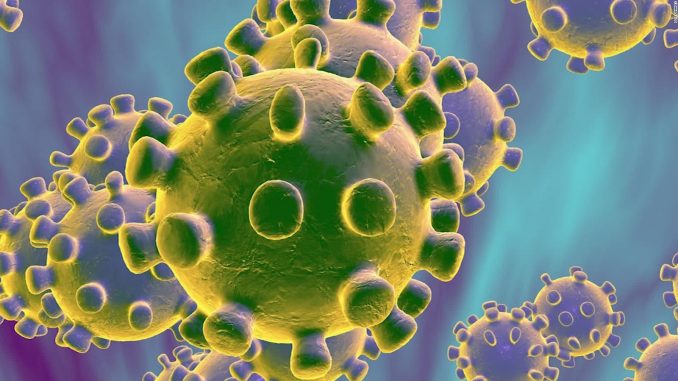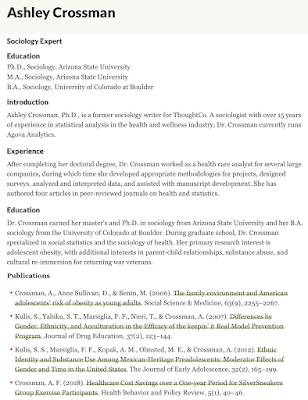
Over the past year, it is very clear that there is a sense of panic among the public, exemplified by the fear of the unmasked, those who stand too close or who go the wrong way down a one way store aisle and, soon, the unvaccinated. While the governments may be the ultimate source of the fear mongering, their servants in the mainstream media are largely responsible for the propagation of what can only be termed "fear porn" or what could be termed "a moral panic". An article by Dr. Ashley Crossman from July 2019 on the ThoughtCo website provides us with a very interesting examination of "moral panic" and how it has been used throughout the past year of the COVID-19 pandemic.
As background, Dr. Crossman has a Ph.D. in Sociology from Arizona State University as shown here:
As well, ThoughtCo is a reference site which focuses on expert-created educationl content and is one of the top ten information sites in the world.
Let's start by looking at Dr. Crossman's definition of a moral panic:
"A moral panic is a widespread fear, most often an irrational one, that someone or something is a threat to the values, safety, and interests of a community or society at large. Typically, a moral panic is perpetuated by the news media, fueled by politicians, and often results in the passage of new laws or policies that target the source of the panic. In this way, moral panic can foster increased social control."
Moral panic is known in the sociology of deviance and crime and was the development of the sociological concept is credited to South African sociologist Stanley Cohen. Cohen introduced the social theory of moral panic in his 1972 book "Folk Devils and Moral Panic" in which he described the British public's reaction to the rivalry between the "rocker" and "mods" youth cultures of the 1960s and 1970s. Here is a quote from his book:
"Societies appear to be subject, every now and then, to periods of moral panic. A condition, episode, person or group of persons emerges to become defined as a threat to societal values and interests…Sometimes the subject of the panic is quite novel and at other times it is something which has been in existence long enough, but suddenly appears in the limelight. Sometimes the panic passes over and is forgotten…at other times it has more serious and long-lasting repercussions and might produce such changes as those in legal and social policy or even in the way society conceives itself."
Cohen outlined five stages of the moral panic process as follows:
1.) Something or someone is defined as a threat to values or interests related to a triggering event
2.) This threat is depicted in an easily recognisable form by the media and is amplified by them, creating a symbolic threat to rally against .
3.) There is a rapid build-up of public concern
4.) There is a response from authorities (government/religious) or opinion makers noting that the threat must be addressed
5.) The authorities introduce changes to address the concerns, the panic recedes or results in social changes
There are significant consequences to moral panic:
1.) The explosive incident will always get more attention than the duller, more complex bigger picture. And when we let that happen, everyone loses.
2.) The innocent can be victimised.
3.) Regulations can be out of proportion to the level of the threat (i.e. the Holocaust)
4.) Threats can be grossly exaggerated
5.) Moral panics simplify complex problems and distract from other (and often far more important) factors.
Here is a quote from Crossman's analysis:
"Cohen suggested that there are five key sets of actors involved in the process of moral panic. They are the threat that incites the moral panic, which Cohen referred to as "folk devils," and the enforcers of rules or laws, like institutional authority figures, police, or armed forces. The news media plays its role by breaking the news about the threat and continuing to report on it, thereby setting the agenda for how it is discussed and attaching visual symbolic images to it. Enter politicians, who respond to the threat and sometimes fan the flames of the panic, and the public, which develops a focused concern about the threat and demands action in response to it."
Here is the great danger of moral panics and the resulting response to them:
"Many sociologists have observed that those in power ultimately benefit from moral panics, since they lead to increased control of the population and the reinforcement of the authority of those in charge. Others have commented that moral panics offer a mutually beneficial relationship between news media and the state. For the media, reporting on threats that become moral panics increases viewership and makes money for news organizations. For the state, the creation of a moral panic can give it cause to enact legislation and laws that would seem illegitimate without the perceived threat at the center of the moral panic."
Does this sound at all familiar?
Historically, there have been many moral panics. Examples include the Salem witch trials, the War on Drugs, the fear of the "gay agenda" and the post-September 11th Islamophobia among others.
Unfortunately, those of us living in the COVID-19 era can add the current pandemic to the list of moral panics. Governments have clearly ramped up fear of a virus, used the media as their bullhorn and convinced untold hundreds of millions of people that the SARS-CoV-2 virus is certain to lead to an early death, despite what the statistics are showing. As a consequence of the COVID-19 moral panic, frightened citizens have been more than willing to allow government edicts to control their lives to unprecedented degrees and suspend what little remained of their civil rights.
If you look at the five states of moral panic as outlined by Stanley Cohen, it is quite clear that we currently exist in a state of moral panic. Political leaders have used the COVID-19 pandemic to reinforce and strengthen their powers and ensure that their subjects will be willing to submit willingly to measures that would not ordinarily be under consideration, for example, an untested, highly experimental vaccine. Our leaders believe (or appear to believe) and have managed to convince us that a single COVID-19 death is unacceptable but any measures taken to vanquish that death are acceptable, no matter how strict because it is morally unacceptable to do anything else.
You can publish this article on your website as long as you provide a link back to this page.


Be the first to comment